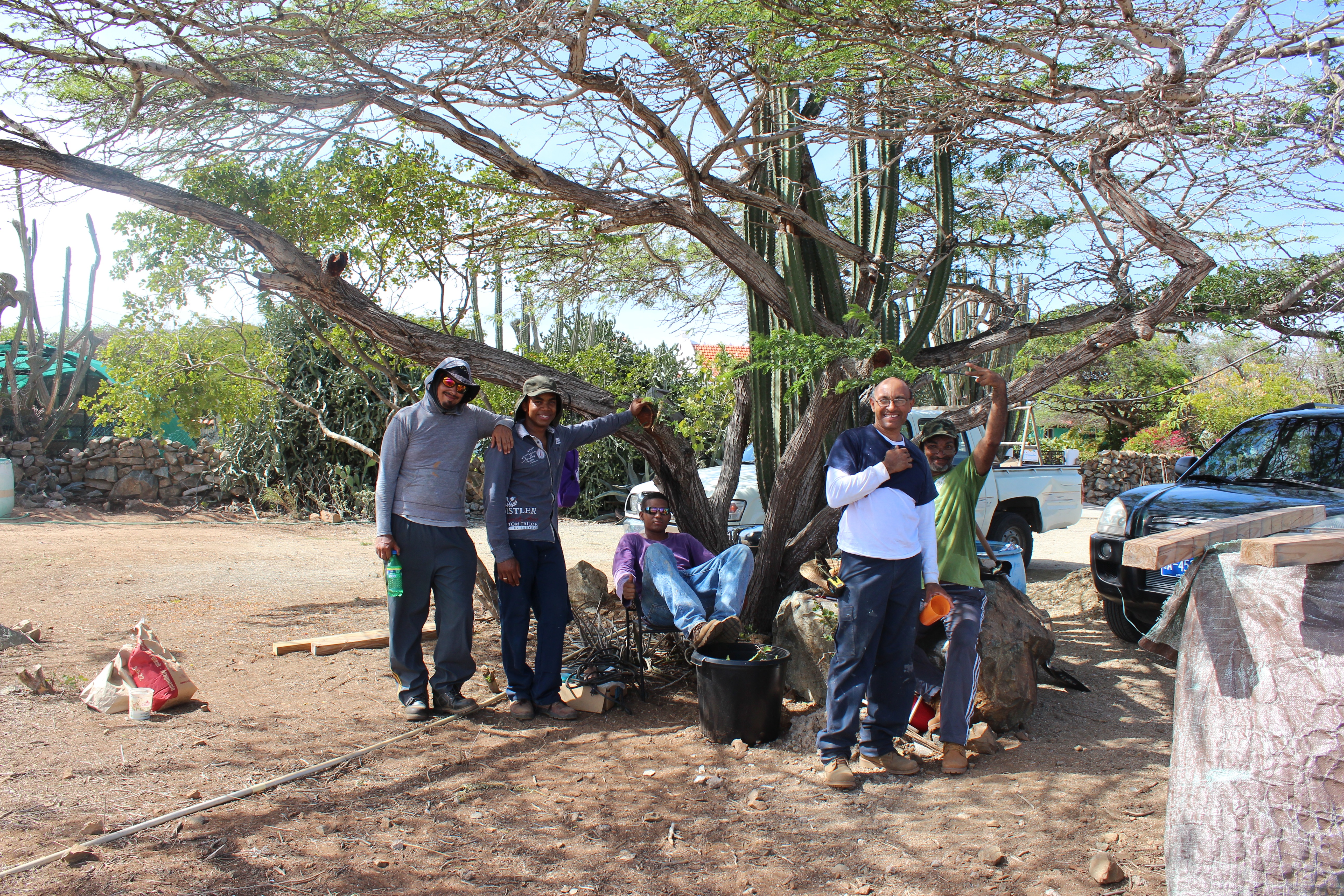ALTO VISTA – Somewhere uphill in Alto Vista you will find a beautiful piece of land with an old, white, traditional cunucu house on it, dating from 1923. Nothing remarkable about that, you might think, as there are many of these old aunties scattered around the island. But this one has an amazing background story. Aruba Today visited the place on a warm, sticky afternoon where James Ocalia was working on the land with a handful of other men.
‘Cas Speransa Nobo’ is the name on the sign of the old cunucu house. It refers to the new hope that is there for the students of the rehabilitation program that is run here. “We call them students rather than drug addicts or clients because they have chosen to learn another life. Their addict life is their past, the goal is to learn and graduate in a new life.” The Aruban James explains that he runs his company –Goshen, which means ‘inundated land’ – with the help of the men that are part of the rehabilitation program. “They learn to cultivate local crops and it works in two ways. For them it is a subject they learn and a daily goal in life, for me it is exercising my job and doing something good for my island at the same time.”
Fair Harvest
While we are walking on the land the students are enthusiastically showing their plants, inviting Aruba Today’s journalist to taste a concomber chikito. The pride in their smiling faces is moving and there is definitely something magical in the air. Maybe it is best described as pure: the land, the taste of the veggies, the drive of the students and the sincerity of James – all together it is ‘Hope’ indeed. On the 7,000m2 land only local crops are grown: concomber chikito (cucumber), yambo (okra), bonchi (beans) and pica (hot peppers) form the main production. But one can also find patia (watermelon) and dragon fruit as well as moringa. “But these are not for commercial use yet,” they share.
The plants are seeded and grown in the nursery, built by the students, and when strong enough they are transferred to the land. “So far we sell only to individuals that come to the house. That goes amazingly well. In the future we would like to sell to supermarkets and hotels.” James works every day on the land with his men, from 1 to 5pm. “Two of them are above 50 years old. It is intensive as for me as it is the
first time I work with addicts. I started with this crew two weeks ago and already learned that I need to be strict and clear. They are different in their approach of life, this is like teaching life again as you do the same to children.”
Cultural Dishes
HopeAruba is a national platform for Civic Synergy that began this project two months ago. The professional caregivers, the couple Shannon and Shawn Blankenship from the United States, live on the premises with their children and work according to the program Teen Challenge. James: “They are here to set up the program for a year and also screen the participants. Hope is a movement, a collaboration of foundations, companies and volunteers that sets up social projects where there is need in society. People here tend to signal social problems and point towards the government, but Hope wants to act upon themselves and make a difference.”
Make a Difference
To make a difference is where both connect. “I myself want to make a difference for my island from my passion: sustainable agriculture. My goal is to have locals eating the typical Aruban veggies and be healthier.” He has a thing for Aruba’s traditional veggies and fruits, since he was a kid.
“I wrote a book, ‘My favorite Curacaos and Aruban Dishes’, and found myself asking my granny how to prepare traditional dishes with local veggies. We need to implement them into modern cooking to preserve this diamond of culture. Italians may have their zucchini and tomatoes, but Aruba has her concomber chikito and yambo. Our generation does not know how to cook with our own veggies, we often are kings in preparing meals coming from the Italian or other foreign gastronomy, but what about our own culture?”
His drive is contagious and creates a curiosity towards the real taste of local gastronomy. “In my opinion three ingredients are necessary to develop social enterprise: the social aspect, the environmental aspect and support of economic pillars, in Aruba’s case, tourism.”
If you wish to see Cas Speransa Nobo for yourself and buy some real local crops, you are welcome at Alto Vista 52 between 1 and 4pm daily, except for the weekends.
Facebook: Goshen Sustainable Development Corporation VBA.

















